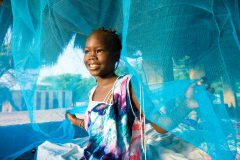Global efforts to control and eliminate malaria have saved an estimated 3.3 million lives since 2000, reducing malaria mortality by half in sub-Saharan Africa, according to the World Malaria Report 2013 published by the World Health Organization (WHO). Nearly 70% of these lives saved were in the 10 countries with the highest malaria burden, and among children under 5 years of age – the group most affected by the disease.
We celebrate the dramatic progress that has been made in reducing the burden of malaria in sub-Saharan Africa. This progress is due to partnership — of national governments, international donors including the U.S. and U.K., The Global Fund, The World Bank, the private sector, non-governmental and faith-based organizations, local leaders, civil society, philanthropists, and many others. But host country governments, the President’s Malaria Initiative (PMI), and The Global Fund deserve special praise for fueling this remarkable progress against malaria.
The United States malaria program through PMI continues to be a “game changer” in the global fight against malaria. Launched in 2005 by former President George W. Bush, PMI has been embraced and expanded by the Obama administration. A collaborative interagency effort that is led by USAID and implemented together with the Centers for Disease Control and Prevention, PMI has supported malaria activities through more than 200 nonprofit organizations, approximately one-third of which are faith based. These groups often have strong and effective bases of operations in underserved rural areas where the burden of malaria is greatest.
In the eighth year of the initiative, the financial and technical contributions made by the USG are major catalysts in the remarkable progress that has been achieved in many countries to reduce the devastating burden of malaria on child mortality.
The Global Fund and PMI’s commitment to effective coordination maximizes our impact on the global malaria burden. Each program has its own unique strengths which contribute to the effectiveness of the partnership and significant success on the ground.
While we celebrate the good news revealed in the WHO World Malaria Report which states that the risk of malaria is declining and more children are surviving, the gains are fragile and could be reversed without continued support. More needs to be done. Millions of people with suspected malaria still do not receive a diagnostic test, and many people with confirmed infections do not receive appropriate treatment with a quality assured antimalarial drug.
Our goal must be to continue to shrink the malaria map and ensure our successes are not reversed, even as we continue to face challenges such as artemisinin-drug resistance and insecticide resistance. In malaria endemic countries, we must leverage higher domestic investments from the public and private sector. And we must engage regional banks to support investment for regional Global Malaria Action Plan needs.
We must continue to engage the private sector in endemic countries in sub-Saharan Africa to identify opportunities for corporate engagement in support of domestic malaria prevention, control, and elimination needs. And we must continue to use smarter and more creative financing to maximize the impact of our investments and promote innovative approaches to address key bottlenecks in the development, introduction, and scale-up of global health technologies and interventions.
Investing in malaria has a powerful return on child survival. Healthy kids are at the heart of every nation’s prosperity and its sustainable development. Healthy children are more likely to live longer, stay in school, and be productive members of their society, generating benefits that reverberate through future generations.
In the Washington Post, Michael Gerson wrote, “In much of sub-Saharan Africa, the American image is now defined by the Peace Corps, PMI and by PEPFAR, the American AIDS relief plan. It is a form of influence that is hard to measure or weigh. But people remember when you help to save their children.” I can attest to this powerful truth.

